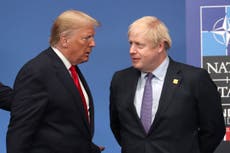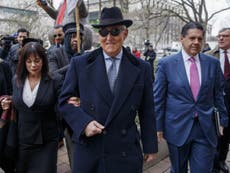The persecution of Uighur Muslims in China shows we have not learned from past genocides
The evidence is all there and the world knows what is taking place. But is this knowledge enough to prompt international action against China?
The persecution of the Uighur people shows we have not learnt the lessons from genocides in Rwanda and Bosnia – Olivia Marks-Woldman
A video is currently circulating in British media which appears to show people with shaved heads, blindfolded, surrounded by armed guards and waiting to be put on a train. The overwhelming evidence suggests these are Uighur (or Uyghur) people, a Muslim group based in China’s Xinjiang region.
This is not the first report of its kind. Over the last couple of years we at the Holocaust Memorial Day Trust (HMDT) have been deeply concerned hearing evidence of people being separated from their families and disappearing, being forced into “re-education camps” by armed guards, and children being taken away to be taught outside of their culture and religion. A recent shipment of human hair which arrived in the US is suspected to be from Uighur people held in these camps. This all follows a long history of prejudice and persecution.
The evidence is all there. We can see what is happening. Despite the challenges facing journalists trying to report from the region, the information which we are seeing is clear, and the world knows what is taking place. But is this knowledge enough to prompt international action?
Over 100 days in 1994, the genocide in Rwanda took place. As the genocide began, United Nations forces were withdrawn from the area. The international community knew what was happening and the UN Security Council debated whether to act. While they did so, whole families were slaughtered in their homes, on their streets, and in churches where they sheltered. The response was too late. Approximately one million Tutsis were murdered. Today, many Rwandans are still asking why the international community failed to step in, leaving whole communities to be murdered.
In 1995, the UN designated “safe area” of Srebrenica in Bosnia was the site of the murder of around 8,000 men and boys over the course of 72 hours. As with Rwanda, the signs were clear that genocide could take place in the region following years of prejudice and increasing tensions, but the international community failed to stop it. We marked the 25th anniversary just days ago. Survivors ask how the genocide could have taken place in what should have been a safe zone.
Gregory H Stanton, president of Genocide Watch, wrote about the 10 steps which tend to take place before, during and after genocides. They include siscrimination, dehumanisation, polarisation and persecution – all things which are clearly taking place in China. The final stage is denial, which does not only occur after genocide has taken place – perpetrators deny the existence of a crime throughout. In recent interviews, Chinese officials have denied any wrongdoing, and insisted any measures taken are simply to discourage religious extremism and terrorism in the region.
Rahima Mahmut, a human rights activist and member of the Uighur community living in the UK, came to speak to our staff team in 2019. She has not heard from her family since 2017. She is desperately trying to raise awareness of what is happening to her people, while feeling powerless to help. In a blog for HMDT, Rahima wrote “the world closes its eyes to their suffering”.
We come together every year on Holocaust Memorial Day (27 January) to remember those who were murdered, and learn about where prejudice and hatred can lead. We encourage people to take action in their own communities – and ask those in positions of power to do the same.
If the international community continues to see the evidence coming from China but refuses to act until it is too late, in years to come on 27 January, will we also learn about the Uighur people and how their culture was destroyed?
The lessons of the past are clear for all to see. If we want to achieve a better future, action must be taken.
Olivia Marks-Waldman is CEO of the Holocaust Memorial Day Trust.






Join our commenting forum
Join thought-provoking conversations, follow other Independent readers and see their replies